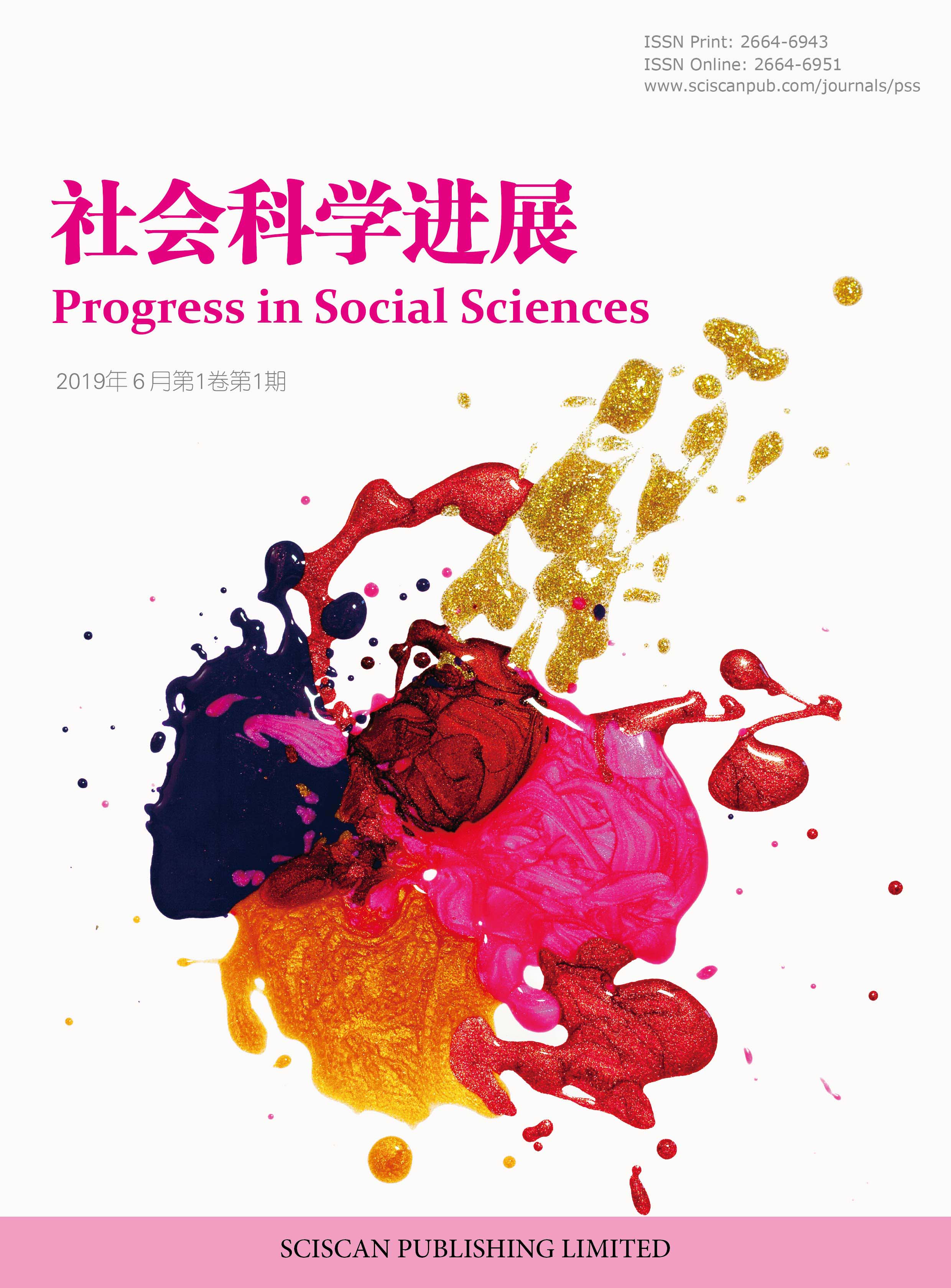Progress in Social Sciences
比较法视野中网络民意与司法实践的冲突和协调
The Conflict and Coordination between Online Public Opinion and Judicial Practice from the Perspective of Comparative Law
- Authors: 吕亮 李翔
-
Information:
上海政法学院,上海
-
Keywords:
Public opinion; Judicial impartiality; Comparative law; Applicable law民意; 司法公正; 比较法; 法律适用
- Abstract: The development of the Internet era has made the circulation andinteraction of information extremely simple, and the development of the ruleof law has become increasingly closely related to the network media, so theenthusiasm of the public to express their opinions on judicial cases has alsobecome higher and higher. In the era of the rapid development of the Internet,the speed of information dissemination is fast, and the public can be informedof major criminal cases across the country in a timely manner and express theiropinions on the Internet. Moreover, in order to uphold judicial openness andpromote the efficiency of the rule of law, public opinion is gradually taking intoaccount in judicial adjudication, so it is inevitable that there will be a conflictbetween judicial adjudication and public opinion, but judicial fairness cannotbe swayed by the agitation of public opinion. For example, the typical JiangGe case and Yao Jiaxin case have aroused a violent reaction in society, which isnot only the handling of criminal cases by the law, but also the emotions andmorality of the people. The difference in judicial culture is one of the reasonsfor the different reactions of China and Japan to the Jiang Ge case. The fact thatthe defendant in this case was not sentenced to death is a normal consequenceof Japan's unique death penalty policy. It is particularly important for judges tostrike a balance between impartiality in administering justice, rationally andcorrectly viewing public opinion, and taking care of public sentiments. 互联网时代的发展使得信息流通与交互变得异常简单,法治工作的开展也与网络媒体之间的联系日益密切,因此民众对司法案件发表意见的积极性也越来越高。在互联网迅速发展的时代,信息传播速度快,民众对全国各地的重大刑事案件都能及时获悉,并在网络上发表意见。且为了坚持司法公开,促进法治效率,民意也逐渐作为司法审判的考虑因素,那么就不免会发生司法审判与民意相冲突的情况,但司法公正不能被民意的激动情绪而左右。如典型的江歌案和药家鑫案,在社会上引起了剧烈的反应,这不仅是法律对刑事案件的处理,也是民众情感与道德,网民或是社会群众都会通过媒体等渠道来表达自己对案件审判结果的看法,民众呼声的高涨对案件的审理无形之中造成了巨大压力。司法文化的相异是造成中国和日本对江歌案反应不同的原因之一。本案被告人没有被判处死刑,属于日本独特的死刑政策的正常结果。法官如何在公正司法,理性正确看待民众舆论,和照顾社会大众情绪之间达成平衡尤为重要。
- DOI: https://doi.org/10.35534/pss.0602026
- Cite: 吕亮,李翔.比较法视野中网络民意与司法实践的冲突和协调[J].社会科学进展,2024,6(2):324-334.
由于网络的开放性、匿名性,网民在网络上的发言比任何时候都自由。极度自由的表达方式和表达方式,使网络舆论混乱无序的现象潜藏着很大的危险。网民自由的发言会导致信息的严重虚伪,诱导不明真相的群众做出错误的判断。网络媒体的个性化倾向使个人意见出现偏狭和攻击性言论,导致对司法审判的恣意评价和对司法机关的过度贬低。网络民意的个人情绪化严重,多数是没有法律基础的普通民众,即使懂法,也未必会对某一案件的特定罪名的量刑有清楚地了解,所以民意并不是在理性基础上做出的正确判断。而当今网络媒体的牟利方式则就是利用群众的激动情绪和从众性来制造话题,引发网络讨论与流量。这种滥用社会舆论挑起群众与司法对立的媒体,必然可以招来群众对司法的大历史受到不信任司法公信力下降严重削弱司法的威严民众沦为“愤怒”的牺牲品,司法活动造成的被动局面。
1 基本案情
1.1 江歌案
2016年11月3日凌晨,江歌在东京所住的公寓里被人杀害,而杀害的她的却是朋友刘鑫的前男友陈世峰。本来陈世峰是来找刘鑫,意图杀害的人也是刘鑫,但江歌出于朋友情谊,拦下陈世峰进而受害。日本东京地方法院以故意杀人罪和恐吓罪判处被告人陈世峰有期徒刑20年,东京法院中写道:“作出如主文所示的判决,判处有期徒刑 20 年。”[1]2021年,江歌母亲对刘鑫提起的生命权纠纷案件。同年12月,江歌母亲江秋莲起诉刘鑫生命权,身体权,健康权纠纷的案件,据江歌母亲江秋莲微博消息,原计划12月31日在青岛开庭的江秋莲因刘鑫生命权纠纷案件,开庭审判暂时取消。2022年1月10日,被告刘暖曦被判处自判决生效之日起10日内赔偿原告江秋莲各项经济损失496,000元,精神损害抚慰金20万元,并承担全部案件受理费。[2]2022年12月30日,山东省青岛市中级人民法院作出二审判决。驳回上诉,维持原判。
1.2 药家鑫案
2010年,被告人药家鑫驾车撞倒一名骑着电动车的受害人张妙,其实撞伤并不足以导致其死亡,但在药家鑫下车查看,见其倒在地上的第一想法不是立即送医救助,而是怕日后被找麻烦,随即掏出随身携带的水果刀多次刺痛被害人致其当场失血过多而死。杀人后,药家鑫驾车逃离又撞伤多名行人。被公安机关逮捕后,在警察机关询问时,药家鑫却否认自己杀人的事实,后又到公安机关自投案自首。
庭审现场药家鑫表示了自己的忏悔之意,向受害人家属下跪表达歉意,同时称“愿和父母尽最大努力赔偿受害人”,然而受害人的诉讼代理人张显却拒绝了4.5万元的民事赔偿,必须判处药家鑫死刑,说白了就是不要钱就要你死。然而尽管如此,药家鑫也本有机会避免死刑,其忏悔态度以及家人积极配合赔偿的因素,药家鑫父亲表示愿意赔偿张妙家人20万元希望和解,这本有机会得到张家的谅解书,这在一定程度上能够避免药家鑫的死刑。而此时,社会舆论喊杀声一片,各种媒体,外界声音,一片哗然,其父母也受到压力影响,拒绝了这20万。在药家鑫执行死刑的前几天,其父已经将20万送到了张家,然而张家不接受,在当场退还无果的情况下,通过汇款的形式退还给了药父。
2 网络民意对司法的影响
网络媒体的个性化倾向使个人意见出现偏狭和攻击性言论,导致对司法审判的恣意评价和对司法机关的过度贬低。网络民意的个人情绪化严重,多数是没有法律基础的普通民众,即使懂法,也未必会对某一案件的特定罪名的量刑有清楚地了解,所以民意并不是在理性基础上做出的正确判断。根据网络民意传达的方式,可以将网络民意分为网络民愤与网络民怜。所谓网络民愤,是指网民基于犯罪行为而引发的一种非常激动与生气的情绪表现,是一种对来自犯罪的刺激表示对犯罪行为人的厌恶、仇视的情绪。而当今网络媒体的牟利方式则就是利用群众的激动情绪和从众性来制造话题,引发网络讨论与流量。这种滥用社会舆论挑起群众与司法对立的媒体,必然可以招来群众对司法的大历史受到不信任司法公信力下降严重削弱司法的威严民众沦为“愤怒”的牺牲品,司法活动造成的被动局面。
2.1 积极影响
(1)查明案件事实
刑事司法首先要保证程序正义,这是保障司法工作开展的第一步。如果在案件调查程序通过刑讯逼供或其他非法途径获得的事实就不一定正确,从而就会导致冤假错案等情况。而司法公开,将民众纳入司法监督,也即社会舆论监督的一环中,有利于保证程序的公正公开。法官在审理案件的过程中,也可以通过网络媒体或者公民个人账号的意见去发现线索,以及群众对案件调查审理等方面存在的问题。但是当网络民意出现普遍惊奇的一致时,说明此案件在当地,乃至全社会都存在相同的价值认定,这有可能是受当地文化风俗等情况影响,就不能单独以法律作为绝对的评判依据而不顾其他,有道言:法外有情。在民族众多的中国社会,要作出能以合法判决为基础,更加合理、更加人性化的判决,必须结合法与情,情与理,才能在社会公众心中树立法治的权威,让社会感受法治的温暖。例如,邓玉娇刺死官员邓贵大案被免予刑罚处罚、小摊贩崔英杰刺死城管被判死缓,这些轻判甚至可能突破了刑法的规定。马克昌教授针对“邓玉娇案”曾指出,若没有民意,邓玉娇至少会判缓刑。
(2)弥补法官的认知不足
法律职业本身就具有较高的专业性,司法判决所依靠的法律法规,普通群众也难以理解。社会群众虽然不具备专门的法律知识,但在生活中,对于符合社会发展和秩序和谐的情况,民众也会有一定的生活经验。法官不仅是司法审判的主体,也是社会群众的一员,法官也需要在法律素养与生活经验之间加以平衡。案件的审理有时间等多方面的限制与约束,既要保证司法的公正,也要追求司法的效率,效率的追求又要保证听取民意,但不能盲目顺从民意,要是案件接近事实接近法律的本意,而非由法官个人和社会决定。许多热心人士想通过调查研究来发现事实的真相。这为法官的案件判决奠定了坚实的基础。
2.2 消极影响
“法律判断是以事实与规则认定为中心的思维活动,这要求法官首先服从规则而不是首先听从情感,要求法官注重缜密的逻辑,在法律规则的范围内,在法律术语的承载下谨慎地对待情感”。而民意大多不是通过法律思维最初的理性判断,情绪化色彩严重,很难中立地看待问题。
(1)影响司法权的独立行使
保证司法权的公平公正首先要保证司法权独立行使,不受其他机关或者团体的干涉与控制,由司法人员凭借自己的职业素养与道德伦理加以使用。要对某一案件作出正确的裁决,司法权要独立行使,而司法权是由具体的工作人员行使,因此司法工作人员的主观意志也不能被民意所左右,一旦被社会风向所吹动,失去自己独立的理性判断,也就很难实现司法权的公正行使,那么也就很难保证案件审判结果的公正。
(2)妨碍司法公正
社会的群众往往用色彩的眼睛对待一件事,使他们从自己的生活经验或朴素的价值观出发,作出主观臆断。草率下结论,性急下结论,徇私舞弊是群众意见的重要特征。在当今浮躁的社会,社会群众的普遍情绪比较激进,对于网络热门案件的判决甚至一律呼吁“死刑”,并不考虑刑法的罪责适应原则。这种非理性思想渗透到司法实践中,会对司法工作造成很大影响,司法工作需要紧密联系,最终作出公正的判决。
(3)损害司法权威
司法权威的树立是通过科学立法、严格执法、公正司法和全民守法共同推进的,四个环节相互分离却又紧密和联系着。全民守法是要通过公众的遵守,体现法律的权威性,民意更是公民守法意识的重要体现;一旦民意脱离法律的轨道,必然对司法公正产生不利的影响。
3 立场与策略
网络民意与司法实践本质上就有许多差别,为了更好地厘清两者的不同所在,现将网络民意与司法的区别作相似的罗列。法律是政治的辅助手段,司法裁判必须以立法宗旨统摄下的价值与规范为根据、以对人类理性和行为的洞察为基础、以法的目的实现为政策目标,“无论得出什么样的结论,判断都必须契合立法意图、人类理性、法政策和法价值”。
3.1 司法立场
网络民意是一种自发的捍卫社会公正、推动社会进步的力量,尽管有时是非理性和情绪化的。如何发挥这种力量对司法公正的促进作用,构建两者和谐关系,是目前亟待研究和解决的现实问题。在笔者看来,两者博弈是制度形成的重要因素。博弈一开始可能是盲目的,有时做出选择甚至是最差的策略,但经过多次博弈,一旦各方能够在理性的思考中明确自己的利益所在,就有可能做出理性的选择,使得制度建构的时机逐渐成熟。与此相对应,在法律程序之外的民意因其沟通和交涉司法过程的作用,也对司法资源的是否启用及法律适用等司法技术方面产生了很大影响。
在网络民意与司法之间的游戏过程中,司法采取什么立场?双方都应将自身利益最大化作为行动的出发点,各主体的决定对对方产生重要的影响,同样,对方的决定也会直接影响行为主体的决定结果。这种把自己的战术建立在对方根据自己的最佳利益行动的基础上,解决问题的方法叫作纳什均衡(Nash Equilibrium),这是非合作均衡。但是由于评价正义的标准不同,双方又很难全面合作。因此,网络舆论,司法的立场是:第一,切断和限制网络舆论;第二,屈从网络民意,想要赢得民众的欢心。第三,相互制约和依赖。
采取第一立场的结果是司法占据了绝对优势。这在现实中并不容易。对于传统媒体,法院可以下达禁令,通过事前或事后控制,防止不正当的舆论干涉,但是在网络上却不能下达禁令,让大众闭嘴。任何控制都需要成本,而完全控制网络肯定会花费高昂到无法承受的程度。从技术本身来看,无法引起网络舆论。另外,司法部采取这种立场存在道义上的不合格原因。网络民意代表着多元的声音,这本身就具有其社会价值。“藐视法庭罪”只有在发言的“明显的、立即的危险”下才被认定。采取相同的两种立场是不可取的,这样网络舆论是占绝对优势的,司法活动剧场化沦落为“广场化”不但浪费司法职业几年的努力,司法“文革”时期的“人民审判”,也可以在无数冤魂沦为大众的原谅中产生。由此可见,相互制约与依存仍将是司法与网络民意各自采取的立场。
3.2 司法策略
在博弈的过程中,一方的策略会对另一方的策略产生重大影响,在司法与网络民意在个案的多次博弈过程中,我们也看到司法过程的一举一动影响着网络民意的取向。根据这种预期调整自己的策略,无疑是司法机关所能采取的最佳作法。刑事被害人国家救助制度的构建需要各个方面的考虑和落实,应包括完善立法、明确救助标准及程序、扩宽补偿资金的来源和设立灵活的补偿方式。
(1)落实司法公开
司法公开是指法院在审判活动中公开法庭审理、裁判文书、执行活动和司法管理信息等内容,使公众可以监督、参与和评价司法工作。落实司法公开是推进司法透明、提高司法公信力、保障司法公正的重要举措。以下是一些方法和措施,可用于落实司法公开:第一、加强法院文书公开:法院应当及时、全面地公开各类裁判文书,包括一审、二审和终审判决书,以及判决结果相关的相关材料。可建立法院文书网站,提供在线查询和下载服务。第二实施庭审公开制度:对于一些具有重大社会关注度的案件,应当公开庭审过程,允许相关的媒体、社会组织和公众进行旁听。可以通过视频直播、网络直播等方式,使更多人可以了解庭审全过程。第三、建立执行信息公开平台:公开执行信息有助于增加执行透明度,确保执行活动的公正性。可以建立执行信息公开平台,发布执行进展、执行结果等相关情况,并提供查询服务。第四、推进司法统计公开:司法统计是对司法工作的客观反映,公开司法统计数据有助于公众了解司法工作的情况,提高司法公信力。可以定期发布各类司法统计数据,包括案件数量、审理时效、判决结果等。第五增加司法政策公开透明:及时公开法律法规、司法解释和司法政策文件,让公众了解司法政策的制定过程、内容和影响。第六、加强司法信息公开宣传:通过各类媒体渠道和官方网站,加大对司法公开的宣传力度,提高公众对司法公开的认识和参与度。
总结起来,落实司法公开需要法院主动采取一系列具体措施,公开法庭审理、裁判文书、执行活动和司法管理信息等内容,确保司法工作的透明度和公正性。这不仅可以增强社会对司法的信任,也为公众参与司法提供了条件。只有落实司法公开,才能更好地维护社会公平正义和人民幸福安康。
司法公开包括程序的公开与结果的公开。目前司法机关在这方面做得还不够,比如有的案件司法部门在没有合法理由的情况下拒绝公众旁听以及记者采访,公众无法行使知情权;有的裁判文书说理论证上存在缺陷,或者对重要问题语焉不详甚至回避,不能不引起民众的怀疑。[3]
(2)建立与完善吸收民意的制度
“只能去要求一个在民意面前表现得更好、更得体的制度,而不能要求活在不正义之下的民众在受到伤害后,永远像绅士一样保持理性和矜持”。建立这一制度,有多种方式。比如更多地让普通公民作为人民陪审员参加审判,他们的意见在一定程度上代表了民意,或者让代表民意的团体提起“公益诉讼”,以此来进行政治参与,还可以借鉴美国司法中“法庭之友”的做法,允许非当事人站在被告或原告一方,向法庭陈述意见。通过种种方式,为民意开辟更多地进入司法场域的制度通道,这样才能给民意一个宣泄的渠道,从而减少在网络上发出的不负责任评论。
(3)发挥网络媒体的积极作用
网络媒体在传播信息、引导舆论等方面发挥着举足轻重的作用,对于司法公正也有一定的影响。首先,网络媒体能够及时报道和追踪案件进展,使法庭审判过程公开、透明。这种公开透明性可以有效预防司法腐败和滥用职权的行为,提高司法公信力。其次,网络媒体在曝光不正当司法行为方面发挥了重要作用。通过报道和曝光不当判决、冤假错案等问题,网络媒体能够引发社会关注和舆论压力,促使相关部门对错误判决进行查证和纠正。此外,网络媒体还能够扮演着舆论监督者的角色,对于司法机关的工作进行监督和评价。媒体可以从公众的角度关注司法工作的公正性和效率性,及时报道司法机关的工作成果和问题,引导社会对司法机关的合理期望和要求,推动司法改革和提升司法公正。然而,网络媒体对司法公正的作用也存在一定的挑战。网络媒体的报道存在一定的主观性和片面性,可能会对案件的公正审判产生一定的干扰。一个谨慎的报道和舆论引导是至关重要的,需要媒体在报道案件时坚持客观公正原则,并对相关信息进行核实和深入分析。
综上所述,网络媒体在司法公正中扮演着重要的角色。媒体可以通过公开透明的报道和舆论引导,对司法的公正性和效率性进行监督和评价,推动司法改革,保障人民的合法权益。然而,媒体在履行这一角色时需要谨慎对待,确保报道的客观公正和以事实为依据,避免对司法公正产生负面的影响。
4 结语
在推进法治进程、建设社会文明、走向现代社会的历史进程中,必须清醒地意识到对国民心态和集体意识进行引导和改造的必要性。在数据网络发展迅猛的时代,立法与司法等领域的信息也必然会在网络上传播,为民众熟知,民众的意见乃至情绪也必然是司法过程不得不考量的因素之一,但且不能以民意决定司法,甚至因为民意的偏差而作出违背法律正义的司法决定。我们能做的,只有法律制裁之后的宽容。“药家鑫”案和“江歌”案带来的社会问题引人深思。所谓的刑事政策,也不是为了迎合民意,而是在严格的讨论和利益权衡下,决心对某一方面的司法态度要进行规制,起到带头示范的作用。正如前段时间同样十分火热的“昆山龙哥案”,最终认定为正当防卫,不是说网络民意使然,而是这样一个案例对我国鼓励对犯罪行为实施反击的绝佳示范,让民众在对抗恶势力时敢于反抗,不要过多考虑附随后果。对网络民意不能一刀切,只能进行一定限制;与此同时要引领法治工作队伍建设,提升司法工作人员的职业素养,从司法领域内部也要保障司法的独立公正,在严格独立审判的同时,让民众在每个案件中感受到司法工作的温度。
参考文献
- 王云海.江歌案和日本的司法文化[J].法律适用(司法案例),2018(3).
- 朱朋.网络民意介入刑事司法之再反思——基于典型刑事案件的研究 [J].西南政法大学学报,2014,16(2).
- 徐光华.个案类型特征视阈下的刑事司法与民意——以2005至2014年130个影响性刑事案件为研究范本[J].法律科学(西北政法大学学报),2015,33(5).
- 刘昂.网络民意与司法的博弈——从冲突走向和谐 [J].北京政法职业学院学报,2011(1).
- 魏治勋.司法裁判的道德维度与法律方法——从江歌案民事一审判决的道德争议切入[J].法律科学(西北政法大学学报),2022,40(5):91-109.
- 杨建军.刑法因果关系的司法证明[J].比较法研究,2020(6).
- 施玙洁.网络民意对司法的影响——比较法视野中的江歌案和药家鑫案[J].湖北经济学院学报(人文社会科学版),2021,18(7):91-95.
- 史雯.江歌案反思:刑事被害人救助制度研究[J].河北北方学院学报(社会科学版),2018,34(5):83-86,98.
- 时延安.中国 2010 年最受关注刑事案件点评[M].北京:中国人民公安大学出版社,2011.
[1] “江歌案”日本东京地方裁判所刑事判决书,崔涵译,案件编号:平28(刑わ)2622号平28(合わ)299 号。
[2] 山东省青岛市城阳区人民法院民事判决书(2019)鲁0214民初9592号。
[3] 比如说刘涌案中,网络民意评论焦点之一就是二审改判死缓的判决书措辞比较含糊,文书表述提到基于“案件的具体情况”作出了改判的判决,但具体情况是什么没有写明。熊秋红著《“刘涌案”拷问刑事司法》。
















